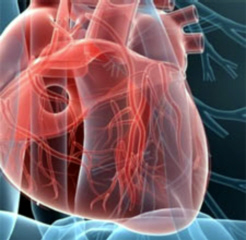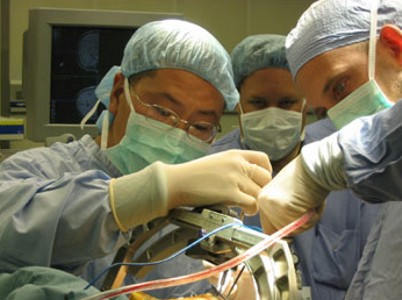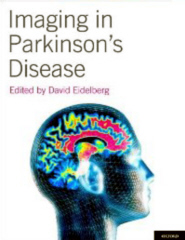25th August 2011 - New research
DOPAMINE AGONISTS INCREASE THE RISK OF VALVULAR REGURGITATION
Movement Disorders [2011] 26 (5) : 801-806 (V.G.Rasmussen,
K.�stergaard, E.Dupont, S.H.Poulsen) Complete
abstract
The use of dopamine agonists increases the risk of valvular regurgitation
in people with Parkinson's Disease. Valvular regurgitation is
when a cardiac valve becomes diseased or damaged, and is no
longer able to close properly. Leakage of blood occurs across the valve.
This leakage of blood is referred to as regurgitation. Valvular
regurgitation can lead to abnormal cardiac function. For more information go to
Mitral valvular regurgitation.
 Cabergoline,
which is also known by the brand names Dostinex and Cabaser,
was the worst of those dopamine agonists assessed.
The likelihood of valvular
regurgitation
in people with Parkinson's Disease taking Cabergoline was more than six
times greater than would otherwise be expected. For a full review of
Cabergoline go to the
Review of Cabergoline. The dopamine agonist
Pergolide, which is also known as Permax, makes valvular
regurgitation
in people with Parkinson's Disease more than three times more likely. The
likelihood of Permax causing valvular
regurgitation led to its withdrawal in the U.S. in 2007, but it is still
used elsewhere. Other dopamine agonists were not assessed. So it is not
known to what extent they are harmful in this respect or if they are
harmful at all.
In order to refer to this article on its own
click here.
Cabergoline,
which is also known by the brand names Dostinex and Cabaser,
was the worst of those dopamine agonists assessed.
The likelihood of valvular
regurgitation
in people with Parkinson's Disease taking Cabergoline was more than six
times greater than would otherwise be expected. For a full review of
Cabergoline go to the
Review of Cabergoline. The dopamine agonist
Pergolide, which is also known as Permax, makes valvular
regurgitation
in people with Parkinson's Disease more than three times more likely. The
likelihood of Permax causing valvular
regurgitation led to its withdrawal in the U.S. in 2007, but it is still
used elsewhere. Other dopamine agonists were not assessed. So it is not
known to what extent they are harmful in this respect or if they are
harmful at all.
In order to refer to this article on its own
click here.
9th August 2011 - New research
THE LONG TERM EFFECTS OF DBS ON PARKINSON'S DISEASE
Archives of Neurology [2011] Published online August 8 (A.Castrioto,
A.M.Lozano, Yu-Yan Poon, A.E.Lang, M.Fallis,
E.Moro)
Complete abstract
Researchers assessed the outcome of Deep
Brain Stimulation of the subthalamic nucleus (STN-DBS) in people with
Parkinson's Disease over a period of 10 years.
Deep Brain Stimulation (DBS) involves the use of
electrodes that are implanted into the brain and connected to a small electrical
device called a pulse generator that can be externally programmed.
DBS requires careful programming of the stimulator
device in order to work correctly. For more information go to
Deep brain stimulation.
 DBS
improved the Parkinson's Disease symptom score by 25% in comparison to no
treatment, including resting and action tremor by over 85%, and bradykinesia by
23%. It did not stop deterioration in speech, walking, and postural instability,
including falling and freezing. L-dopa dosages reduced to about 63% of what they
were initially. Daily living activity also improved. Dyskinesia and motor
fluctuation scores also remained significantly lower. Potential adverse events
included : a trend to weight loss, visual hallucinations, impulse control
disorders possibly related to dopamine agonists, progressive cognitive decline
culminating in dementia, device related infections. In order to refer to
this article on its own
click here.
DBS
improved the Parkinson's Disease symptom score by 25% in comparison to no
treatment, including resting and action tremor by over 85%, and bradykinesia by
23%. It did not stop deterioration in speech, walking, and postural instability,
including falling and freezing. L-dopa dosages reduced to about 63% of what they
were initially. Daily living activity also improved. Dyskinesia and motor
fluctuation scores also remained significantly lower. Potential adverse events
included : a trend to weight loss, visual hallucinations, impulse control
disorders possibly related to dopamine agonists, progressive cognitive decline
culminating in dementia, device related infections. In order to refer to
this article on its own
click here.
3rd August 2011 - New book
IMAGING IN PARKINSON'S DISEASE
David Eidelberg
 Publisher's
description : Imaging in Parkinson's Disease provides up-to-date information
concerning new applications of brain imaging to the study of Parkinson's
Disease. Written by experts in the field, the book focuses on structural and
functional imaging methods that have recently been applied to study Parkinson's
Disease, with emphasis on the development of the major motor manifestations of
the illness as well as cognitive impairment and dementia. Individual chapters
address the role of imaging in differential diagnosis and the evaluation of
treatment effects. Covering a wide range of subjects and being beautifully
illustrated, it is a valuable reference for neurologists, neurosurgeons,
neuropsychologists, and for biomedical students.
Click here for more details.
For
more books concerning Parkinson's Disease go to
Parkinson's Disease Books.
In order to refer to this article on its own
click here.
Publisher's
description : Imaging in Parkinson's Disease provides up-to-date information
concerning new applications of brain imaging to the study of Parkinson's
Disease. Written by experts in the field, the book focuses on structural and
functional imaging methods that have recently been applied to study Parkinson's
Disease, with emphasis on the development of the major motor manifestations of
the illness as well as cognitive impairment and dementia. Individual chapters
address the role of imaging in differential diagnosis and the evaluation of
treatment effects. Covering a wide range of subjects and being beautifully
illustrated, it is a valuable reference for neurologists, neurosurgeons,
neuropsychologists, and for biomedical students.
Click here for more details.
For
more books concerning Parkinson's Disease go to
Parkinson's Disease Books.
In order to refer to this article on its own
click here.
.gif)
.gif)
 Cabergoline,
which is also known by the brand names Dostinex and Cabaser,
was the worst of those dopamine agonists assessed.
The likelihood of valvular
regurgitation
in people with Parkinson's Disease taking Cabergoline was more than six
times greater than would otherwise be expected. For a full review of
Cabergoline go to the
Cabergoline,
which is also known by the brand names Dostinex and Cabaser,
was the worst of those dopamine agonists assessed.
The likelihood of valvular
regurgitation
in people with Parkinson's Disease taking Cabergoline was more than six
times greater than would otherwise be expected. For a full review of
Cabergoline go to the  DBS
improved the Parkinson's Disease symptom score by 25% in comparison to no
treatment, including resting and action tremor by over 85%, and bradykinesia by
23%. It did not stop deterioration in speech, walking, and postural instability,
including falling and freezing. L-dopa dosages reduced to about 63% of what they
were initially. Daily living activity also improved. Dyskinesia and motor
fluctuation scores also remained significantly lower. Potential adverse events
included : a trend to weight loss, visual hallucinations, impulse control
disorders possibly related to dopamine agonists, progressive cognitive decline
culminating in dementia, device related infections. In order to refer to
this article on its own
DBS
improved the Parkinson's Disease symptom score by 25% in comparison to no
treatment, including resting and action tremor by over 85%, and bradykinesia by
23%. It did not stop deterioration in speech, walking, and postural instability,
including falling and freezing. L-dopa dosages reduced to about 63% of what they
were initially. Daily living activity also improved. Dyskinesia and motor
fluctuation scores also remained significantly lower. Potential adverse events
included : a trend to weight loss, visual hallucinations, impulse control
disorders possibly related to dopamine agonists, progressive cognitive decline
culminating in dementia, device related infections. In order to refer to
this article on its own
 Publisher's
description : Imaging in Parkinson's Disease provides up-to-date information
concerning new applications of brain imaging to the study of Parkinson's
Disease. Written by experts in the field, the book focuses on structural and
functional imaging methods that have recently been applied to study Parkinson's
Disease, with emphasis on the development of the major motor manifestations of
the illness as well as cognitive impairment and dementia. Individual chapters
address the role of imaging in differential diagnosis and the evaluation of
treatment effects. Covering a wide range of subjects and being beautifully
illustrated, it is a valuable reference for neurologists, neurosurgeons,
neuropsychologists, and for biomedical students.
Publisher's
description : Imaging in Parkinson's Disease provides up-to-date information
concerning new applications of brain imaging to the study of Parkinson's
Disease. Written by experts in the field, the book focuses on structural and
functional imaging methods that have recently been applied to study Parkinson's
Disease, with emphasis on the development of the major motor manifestations of
the illness as well as cognitive impairment and dementia. Individual chapters
address the role of imaging in differential diagnosis and the evaluation of
treatment effects. Covering a wide range of subjects and being beautifully
illustrated, it is a valuable reference for neurologists, neurosurgeons,
neuropsychologists, and for biomedical students.